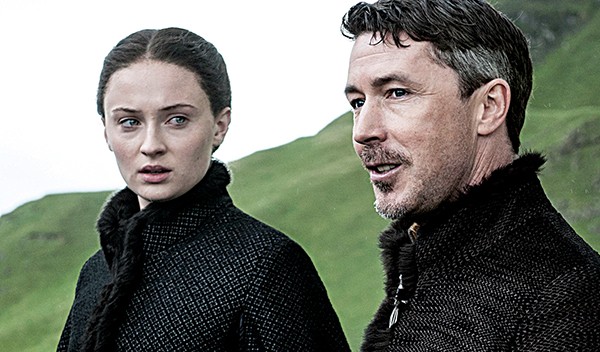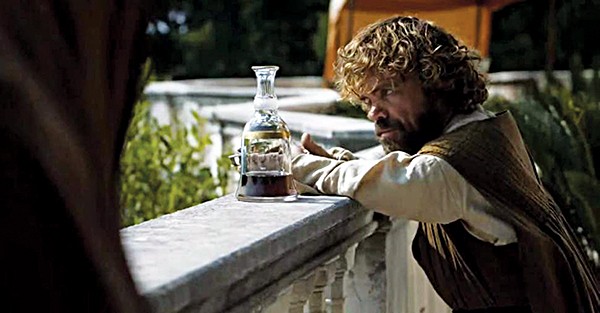Game of Thrones is about a vampiric government sleepwalking toward impending disaster. Some would say that is why it has captured the zeitgeist. Others would say you just throw money at the zeitgeist and it does what you want. We are the ruled. The exercise of power in our lives — whether by government or corporate house — is something
we receive.
The premiere episode of the fifth season, which aired last Sunday, returns to the subject of obtaining and maintaining power. It’s appealing because the serfs — us — are mainly offscreen. So many of its favored characters are royals or nobles or secret royals. They are born into agency, then according to their respective empathy levels, proceed to brutally or morally pursue change.

Game of Thrones, Season 5
The audience I saw it with was rowdy. They yelled at man ass and gasped at cut throats. They were wearing costumes — I sat near a lovely Tormund Giantsbane and Brienne of Tarth — drank from fake goblets, and ate chicken legs. As the show started its plot machinery for the year, they maybe wanted a little more action, a little more thrill. Instead, it started contemplatively, giving us a childhood witch’s prophecy that fuels the neuroticism of the evil but sympathetic queen Cersei (Lena Headey). Elsewhere, a eunuch warrior went to a brothel in order to be held. Lancel Lannister (Eugene Simon), one of my favorite comic-relief characters, returned with a monk’s tunic and a shaven head, having found consolation in religion. We saw warrior king Mance Rayder’s (Ciarán Hinds) proud bearing ebb away into vulnerability on his way to being burnt at the stake. These tender moments are good.
But couched in that is something sad: doom. This is a nondemocratic world about to crumble into apocalypse. Ice zombies and dragons are closing in on Westeros from either end. There’s tension between the portrayal of medieval realpolitik — what series author George R.R. Martin calls “Aragorn’s tax policy” — and how reassuring a godlike eagle’s eye view of doom can be. The realistic character work and worldbuilding are spiced not only with heavy dollops of fantasy war, titillation, and sex, but the comfort that a corrupt world is explainable because it’s fueled by the Olympian lusts of a powerful few. Order in a crooked universe is preferable to the anarchy without it.
“The future is shit, just like the past,” says Tyrion Lannister on being freed from the crate in which he’s been hiding on an eastbound ship, recounting pushing his literal feces out of holes in the side. The premiere’s director, Michael Slovis, wonderfully shows off his Breaking Bad roots by giving us first-person glimpses of a passing marketplace through those holes. The eunuch Varys tells him he wants to install dragon mother Daenerys Targaryen (Emilia Clarke) on the Iron Throne to create “Peace. Prosperity. A land where the powerful do not prey on the powerless.” Tyrion answers, “Where the castles are made of gingerbread and the moats are filled with blackberry wine. The powerful have always preyed on the powerless, that’s how they became powerful in the first place.”

Peter Dinklage
This is the bedrock of the show. It soups up its soap opera by making its deaths more realistic and therefore unpredictable. But the emphasis on face-crushing and disemboweling also implies that the world is so brutal it may not be worth sticking your neck out. That’s a defeatist sentiment those of us interested in complex and decadent entertainment may not agree with. It’s the opposite of The Wire, which tried to explain the complex way a social order regenerates itself and traps its participants, who were often dirt poor. Game of Thrones is not revolutionary, even though the horribleness of its hereditary monarchy is a foregone conclusion. You get lost in the details of this lovingly realized, tragic world.
Showrunners David Benioff and Dan Weiss get better each year at streamlining those details. They have removed Viking pirates, vengeful zombie mothers, and much repetition. But the digressions that strangle Martin’s literary narrative also keep its hopelessness from becoming airtight. Streamlining the world makes it more clockwork in its dourness. The moneyed are further removed from changing things, but they are the only ones who can. This may not be accidental. Martin is a conscientious objector to the Vietnam War from New Jersey. Benioff is the son of the former head of Goldman Sachs.
Tearing down corruption is a hopeful thing. When your dragons breathe fire, you want them to
shine bright.